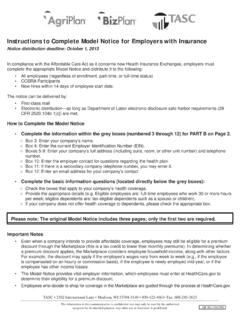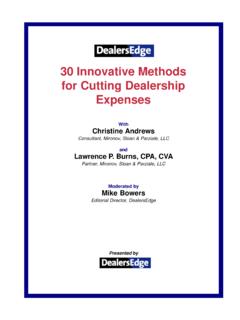Transcription of Love and loans - MoneySmart
1 love and 2011 1 Has a family member or friend ever asked you to be a co-borrower or to guarantee a loan for them? Before you agree to be a guarantor or co-borrower on a loan , think carefully you could lose a agreed to guarantee a business loan for her sonOur family ran caf s for years until my late husband became too ill to work. My son Leo grew up working for the family business. I thought he could make a go of it. But I didn t know that he had a gambling few months after I signed the business loan for him, Leo got behind in repayments. Then he got evicted from the caf for not paying rent. The bank and the landlord contacted me to pay back what was owed. I m afraid I ll have to sell my house to pay it all does being a guarantor work?
2 XIf a lender thinks a borrower may not be able to repay a loan , they will ask for a guarantee. XIf you sign a guarantee for a friend or family member, you are promising to pay the entire loan back if they cannot or will not do so, along with any fees, charges and interest. And if your guarantee is secured against an asset like your home, you may end up losing it or other assets if you don t have the money to pay out the loan you ve guaranteed. You may also be made bankrupt by the credit provider, which means that even assets that have not been offered as security for the guarantee may be sold to pay the outstanding debt. XBeing a guarantor does not give you anything. You do not have any rights to own the property bought with the loan , nor will it give you a good credit record if the borrower pays off the loan .
3 You may however, end up with a bad credit record if the borrower doesn t pay and you cannot. Being a guarantor may interfere with your ability to get a loan , as the guarantee is recorded as your debt. You may have also had to surrender the title deeds to your home, which will mean you may not be able to use your home as security for a loan of your own if you need does being a co-borrower work? XAs a co-borrower, you will be legally responsible for the whole debt if the other person does not make repayments on the loan , not just your share. If neither of you can pay the debt, you will probably end up with a default listing on your credit report, making it hard to borrow money for several years, and you risk being made bankrupt.
4 TIPDo not sign a loan as a co-borrower unless you are also getting a share of the benefit (such as sharing ownership of a house or car). love and 2 TIP Think carefully before guaranteeing a loan XThink very carefully before giving a guarantee if you are at risk of losing your only home if the borrower does not pay. XDo you need to give a guarantee? Is there some other way you could help without going guarantor? For example, you might be able to contribute to a deposit so that it is bigger and a guarantee is not required. XFind out how the borrower intends to repay the loan . Do they have a regular income, for example? XYou must be able to pay back the loan if the borrower cannot. This could mean selling assets, such as a house or car.
5 XDo you have a plan for how you will repay the debt if the borrower does not pay? Some options to consider: XDo you have assets you don t need that you can sell to pay the debt? XDo you have savings to cover the debt? XCan you afford to make the repayments on the loan if the borrower stops making repayments? XIf you are being asked to guarantee a business loan , make sure you find out everything you can about the business. For example, check the past financial statements and speak to the business s accountant for an outsider s opinion. XIf you still want to go ahead with the guarantee, you should enquire about whether you can reduce the amount you are guaranteeing. It is worth trying to negotiate a lower amount.
6 XThink about the possible effect this guarantee may have on your relationship with the borrower if something goes wrong. It may be better to say no now, rather than having a more damaging disagreement later if things go wrong. XNever allow a family member to pressure or force you into signing anything that you don t want to sign. If a large amount of money is involved, talk with a lawyer or get free legal advice to make sure you understand the risks you are taking on. Consult a community legal centre (see ), your state s Legal Aid office (see ) or look in the front section of your telephone directory for legal support services. XIf you re feeling pressured, see a free financial counsellor or go to your local community legal centre for help.
7 You can also find out more about financial counselling by contacting Financial Counselling Australia (see ) or calling ASIC s Infoline on 1300 300 630. XIn certain limited situations, a guarantor may be able to challenge a claim for payment of a guarantee even where a contract was signed. You should get legal advice immediately if, at the time you signed a guarantee, you: Xsuffered from a disability or mental illness Xonly agreed to sign through pressure or fear Xdid not understand the nature of the documents, or the extent of the risk you were taking on, and did not receive legal advice before signing (for example, you may have thought you were giving a guarantee limited to a certain amount of money but a much larger amount is now being claimed, or you believe that the credit provider or broker used unfair tactics, or tricked or misled you when arranging the finance).
8 love and 3 What to ask the credit provider before you guarantee a loanWhat type of guarantee are you providing? XIs the guarantee for a fixed amount of money, or is it for all monies? You are better off guaranteeing a fixed amount because you will know exactly what you owe. If you sign an all monies guarantee, you may be legally responsible to pay all amounts the borrower owes now and in the future. This could include interest, fees, charges and penalties. XIf you believe that there has been an increase to the amount you have agreed to guarantee without your consent, seek legal advice without s the exact amount you re guaranteeing? XThe guarantee should clearly state the exact amount of money you will owe if the worst happens and the borrower does not you lose assets?
9 XYou may be asked to provide a mortgage over your house as a guarantee. So you may have to sell your house to pay the loan if the borrower does not pay. Do you have a copy of the loan contract? XThe loan contract should tell you the amount of the loan and the interest rate on it, and whether the loan is secured (which means that the borrower is providing an asset, such as their house, as security). XIt should also state the term of the loan how long the borrower has to repay the loan and the amount of the loan type of loan are you guaranteeing? XBe very careful about guaranteeing a loan that has no specific period of time in which it needs to be repaid, such as an overdraft or a line of credit. This kind of loan could theoretically go on and 4 What happens if a relationship breaks down?
10 XA breakdown in your relationship can affect every part of your life, including your finances. You might find yourself supporting your children with little or no help from your ex-partner, or stuck with joint debts your ex-partner is unwilling or unable to help you pay. XIf you signed a loan contract as a co-borrower or guarantor (or you were a director of a family company or partner in a business), you might be liable for your ex-partner s debts. XIn most cases, you won t be able to get out of loan contracts you made in the past, but you should get legal advice about where you stand. XVisit to find a community legal centre, consult one of the state Legal Aid offices listed at , or look in the front section of your telephone directory for legal support services.


















